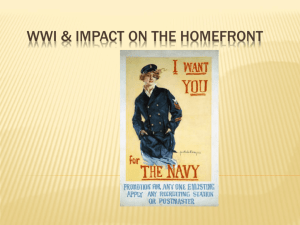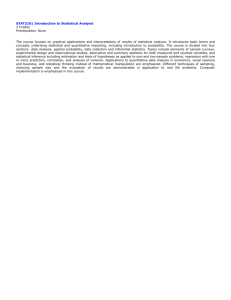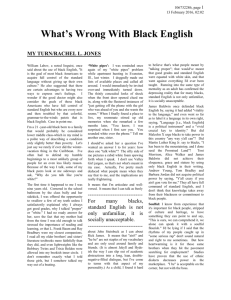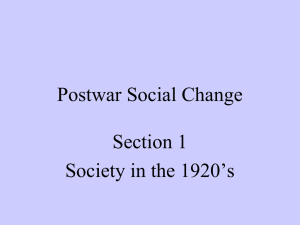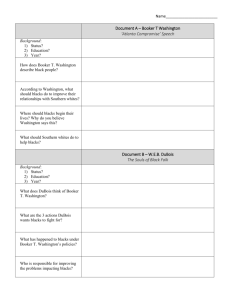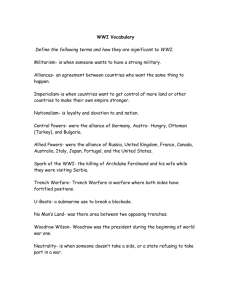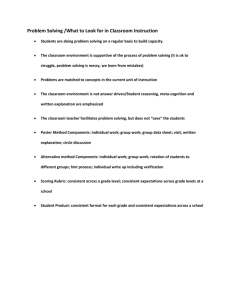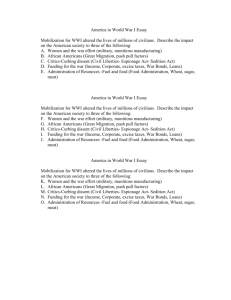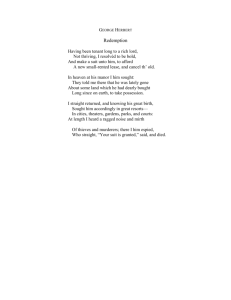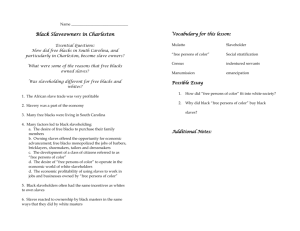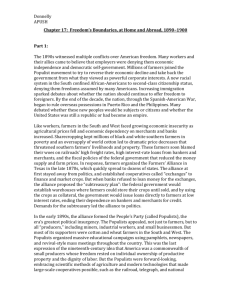Review sheet - Writing History
advertisement
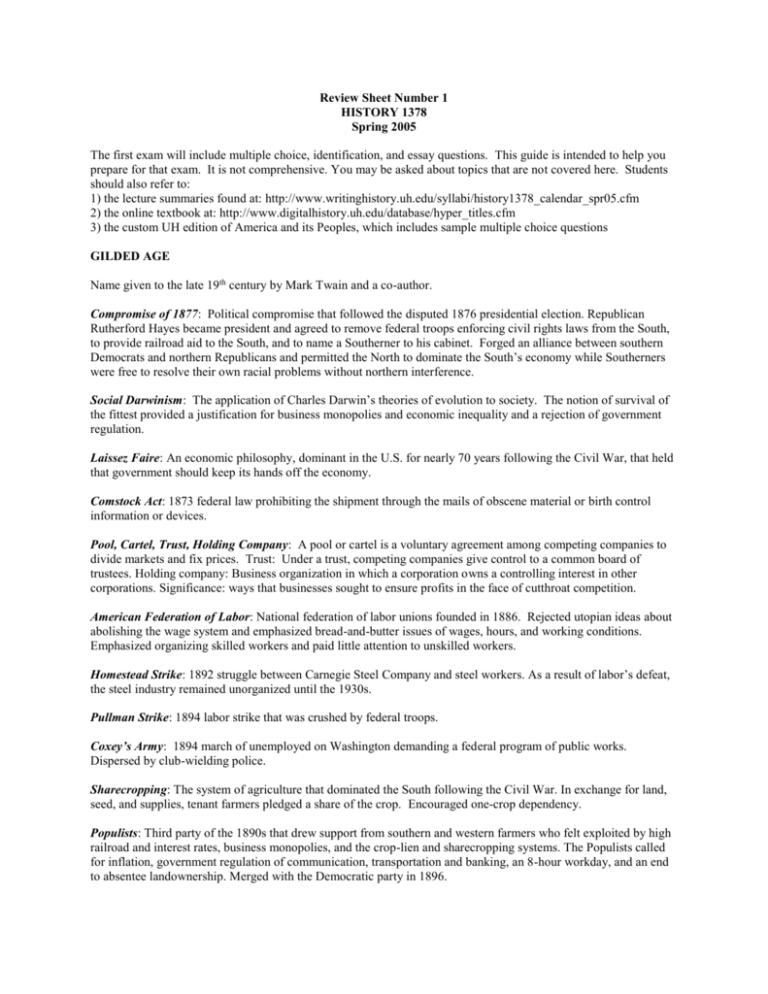
Review Sheet Number 1 HISTORY 1378 Spring 2005 The first exam will include multiple choice, identification, and essay questions. This guide is intended to help you prepare for that exam. It is not comprehensive. You may be asked about topics that are not covered here. Students should also refer to: 1) the lecture summaries found at: http://www.writinghistory.uh.edu/syllabi/history1378_calendar_spr05.cfm 2) the online textbook at: http://www.digitalhistory.uh.edu/database/hyper_titles.cfm 3) the custom UH edition of America and its Peoples, which includes sample multiple choice questions GILDED AGE Name given to the late 19th century by Mark Twain and a co-author. Compromise of 1877: Political compromise that followed the disputed 1876 presidential election. Republican Rutherford Hayes became president and agreed to remove federal troops enforcing civil rights laws from the South, to provide railroad aid to the South, and to name a Southerner to his cabinet. Forged an alliance between southern Democrats and northern Republicans and permitted the North to dominate the South’s economy while Southerners were free to resolve their own racial problems without northern interference. Social Darwinism: The application of Charles Darwin’s theories of evolution to society. The notion of survival of the fittest provided a justification for business monopolies and economic inequality and a rejection of government regulation. Laissez Faire: An economic philosophy, dominant in the U.S. for nearly 70 years following the Civil War, that held that government should keep its hands off the economy. Comstock Act: 1873 federal law prohibiting the shipment through the mails of obscene material or birth control information or devices. Pool, Cartel, Trust, Holding Company: A pool or cartel is a voluntary agreement among competing companies to divide markets and fix prices. Trust: Under a trust, competing companies give control to a common board of trustees. Holding company: Business organization in which a corporation owns a controlling interest in other corporations. Significance: ways that businesses sought to ensure profits in the face of cutthroat competition. American Federation of Labor: National federation of labor unions founded in 1886. Rejected utopian ideas about abolishing the wage system and emphasized bread-and-butter issues of wages, hours, and working conditions. Emphasized organizing skilled workers and paid little attention to unskilled workers. Homestead Strike: 1892 struggle between Carnegie Steel Company and steel workers. As a result of labor’s defeat, the steel industry remained unorganized until the 1930s. Pullman Strike: 1894 labor strike that was crushed by federal troops. Coxey’s Army: 1894 march of unemployed on Washington demanding a federal program of public works. Dispersed by club-wielding police. Sharecropping: The system of agriculture that dominated the South following the Civil War. In exchange for land, seed, and supplies, tenant farmers pledged a share of the crop. Encouraged one-crop dependency. Populists: Third party of the 1890s that drew support from southern and western farmers who felt exploited by high railroad and interest rates, business monopolies, and the crop-lien and sharecropping systems. The Populists called for inflation, government regulation of communication, transportation and banking, an 8-hour workday, and an end to absentee landownership. Merged with the Democratic party in 1896. Mississippi Plan: Scheme adopted in the South during the 1890s to deprivate African Americans of the vote. The plan involved literacy tests and poll taxes. To insure that not too many whites were disqualified, southern states instituted the "grandfather" clause and the "understanding" clause. Plessy v. Ferguson: Controversial 1896 Supreme Court decision upholding a Louisiana law that required segregated railroad accommodations. Said that the Constitution did not prohibit “separate but equal” public facilities for blacks and whites. Overruled by the 1954 case of Brown v. Board of Educaiton Booker T. Washington: Black leader who called on blacks to accept segregation and disfranchisement in exchange for educational and economic opportunities. Spanish-American War: Decisive American victory prompted by American sympathy for Cuban rebels, a jingoistic yellow press, a mysterious explosion aboard the battleship Maine, and the DeLome letter showing contempt for President McKinley. The U.S. received Puerto Rico, Guam, and the Philippines, where it fought a guerrilla war. PROGRESSIVE ERA Progressivism: Reform movement that sought to 1) address the ills of urban industrial life such as poverty, child and female labor, and industrial accidents; 2) eliminate political corruption and democratize politics through such innovations as direct election of senators, women’s suffrage, city managers, at-large voting, and the recall, the initiative, and the referendum; and 3) uplift morals by enacting prohibition and eliminating red light districts. Achievements included expanded government regulation of business, a central banking system, trust-busting, pure food and drug laws, workmen’s compensation, and progressive taxation. Progressives established the Departments of Commerce and Labor, the Federal Trade Commission, and the Federal Reserve. Muckrakers: Journalists, novelists and social critics who exposed abuses in business and corruption in politics. Pure Food and Drug Act: Barred the sale and manufacture of adulterated or falsely labeled drugs and foods. Inspired by Upton Sinclair’s novel about the Chicago stockyards, The Jungle. Initiative, Recall, Referendum: Initiative refers to a procedures through which legislative may be introduced or enacted directly by the people. Recall allows voters to remove an official from public office. A referendum allows the people to directly vote on an issue of public policy. New Immigrants: Unlike the old immigrant groups that came from northern and western Europe, the new immigrants came from southern and eastern Europe and were largely Catholic or Jewish in religion. Armory Show: The first exhibition of modern art in the United States, the show took place in New York in 1913. Prohibition: Constitutional amendment prohibiting the manufacture and sale of alcoholic beverages. Roosevelt Corollary to the Monroe Doctrine: Asserted the right of the United States to exercise police power in the Americas in order to prevent intervention by foreign powers. WORLD WAR I Causes: The assassination of Archduke Franz Ferdinand, heir to the Austro-Hungarian throne, led the Austrian government to seek to crush Serbian nationalism, prompting other nations to be pulled into the conflict as a result of a complex system of alliances. American Involvement: Factors that contributed to American involvement included unrestricted German submarine warfare, the sinking of the Lusitania, the Zimmermann note, and Woodrow Wilson’s determination to shape the peace settlement. Zimmermann Note: Intercepted telegram that offered Mexico a military alliance with Germany, allowing it to take back Texas New Mexico, Arizona, and parts of California. It escalated tensions between the U.S. and Germany. 2 Espionage and Sedition Acts: Legislation limited civil liberties enacted in 1917 and 1918. The Espionage Act provided punishment for disloyalty or interference with the draft. The Sedition act provided punishment for published writings. Almost 2000 cases were tried under these acts. Schenck v. United States: Supreme Court decision upholding the constitutionality of the Espionage and Sedition Acts. The decision declared that freedom of expression allowed in peacetime might be restricted in wartime. 14 Points: President Wilson’s statement of U.S. war aims in World War I which sought to provide a moral justification for the war and a basis for future peace. It called for an end to secret treaties, free trade, freedom of the seas, and universal self-determination. 1920s: Red Scare: Following World War I, fear of communism and radicals swept the nation. Alleged subversives were jailed and many aliens were deported. Sacco and Vanzetti: Celebrated case involving two immigrant anarchists accused of double murder in 1920. The case raised the question of whether unpopular minorities could receive a fair trial. Ku Klux Klan: Revived organization that opposed blacks, Jews, Catholics, and the foreign born. Its membership peaked at 5 million and gained control of many state legislatures. Marcus Garvey: Charismatic Jamaican born black leader who is regarded as the founder of modern black nationalism and was later convicted of mail fraud and deported from the United States. He created an international movement that emphasized separation from whites, black-owned businesses, appreciation of blacks’ racial heritage, and redemption of Africa from European colonialism. Harlem Renaissance: The flowering of literature, art, music, and theater among African Americans in New York during the 1920s. This movement celebrated black’s racial heritage and emphasized black perspectives. Scopes Trial: Test case involving the constitutionality of state laws barring the teaching of evolution in public schools. Attracted national publicity to the conflict between religious fundamentalists and modernists. National Origins Act: 1924 law establishing immigration quotas that favored immigrants from northwestern Europe. Teapot Dome: Scandal during the Harding Administration that involved the leasing of U.S. Navy oil reserves in Wyoming. Resulted in the Interior Secretary going to prison. GREAT DEPRESSION Causes: These included maldistribution of income, excessive inventories, slump in agricultural prices, bank failures, excessive speculation in stocks, and high federal tariff barriers. New Deal: Programs of relief and reform instituted by FDR to address the problems caused by the Great Depression. Achievements include insured bank deposits, stock market regulation, and Social Security. 100 Days: 100 days following Roosevelt’s inauguration that instituted such reform and relief measures as the NRA, the AAA, the CCC, insured bank deposits, the Tennesee Valley Authority to provide electricity and flood control. NRA: Established codes of fair competition in industry. Sought to control production, wages and prices to facilitate recovery from the Depression through codes created by management, workers, and consumers (represented by government). 3 Agricultural Adjustment Act (AAA): New Deal legislation that paid subsidies to farmers to cut production. A boon to landowners, but of little benefit to tenants and sharecroppers. WPA: Massive public works program that provided work to 3.5 million of the unemployed, including many writers and artists. CCC: To address the problem of unemployment among young men 18-25, some 3 million young men served in the Civilian Conservation Corps, planting trees, building public parks, draining swamps, restocking rivers with fish, and working on flood control projects and other work that helped to conserve the environment. Wagner Act (National Labor Relations Act): 1935 law outlawing unfair practices against unions and recognized the right of labor to bargain collectively. Charles Coughlin: Roman Catholic radio priest who inveighed against banks and Jews Huey Long: Governor of Louisiana and U.S. Senator whose Share Our Wealth program called on government to heavily tax the nation's rich and privileged and guarantee every family in the nation an annual income of $5,000 Francis Townshend: Doctor who helped create a mass movement when he called on the federal government to provide a pension of $200 per month to every citizen age 60 and older. Social Security: 1935 New Deal legislation that provided financial assistance to the elderly, the indigent, and compensation to workers injured on the job. Court Packing: Roosevelt’s unsuccessful attempt after the 1936 election to alter the composition of the Supreme Court. Contributed to the decline of the New Deal. ESSAY QUESTIONS: 1. The late 19th and early 20th centuries witnessed profound changes in American values and behavior. Describe the changes that took place in American cultural values, sports, music, women's roles, communication, and entertainment, and explain why these changes took place. 2. Compare and contrast the Populist movement, the Progressive movement, and the New Deal in terms of their causes, goals, the nature of their support, and achievements. 3. Race relations in the United States were never worse than in the late 19th century and first two decades of the 20th century. How would you explain the worsening of race relations, including legal segregation, disfranchisement, the upsurge in lynching and race riots? Also, explain how African American leaders responded to the worsening of race relations. 4. America emerged as a world power between 1890 and 1920. How would you explain this? Was the United States motivated primarily by humanitarian or economic motives or by something else? How would you assess the consequences of America’s growing involvement in the world during this period? Did it make the world more stable, peaceful, and democratic? 4
